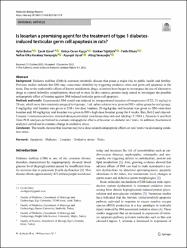| dc.contributor.author | Buhur, Aylin | |
| dc.contributor.author | Gürel, Çevik | |
| dc.contributor.author | Kuşçu, Gökçe Ceren | |
| dc.contributor.author | Yiğittürk, Gürkan | |
| dc.contributor.author | Oltulu, Fatih | |
| dc.contributor.author | Karabay Yavaşoğlu, Nefise Ülkü | |
| dc.contributor.author | Uysal, Ayşegül | |
| dc.contributor.author | Yavaşoğlu, Altuğ | |
| dc.date.accessioned | 2023-01-03T14:18:34Z | |
| dc.date.available | 2023-01-03T14:18:34Z | |
| dc.date.issued | 2022 | en_US |
| dc.identifier.citation | Buhur, A., Gürel, Ç., Kuşçu, G.C. et al. Is losartan a promising agent for the treatment of type 1 diabetes-induced testicular germ cell apoptosis in rats?. Mol Biol Rep (2022). https://doi.org/10.1007/s11033-022-08172-9 | en_US |
| dc.identifier.issn | 03014851 | |
| dc.identifier.uri | https://doi.org/10.1007/s11033-022-08172-9 | |
| dc.identifier.uri | https://hdl.handle.net/20.500.12809/10478 | |
| dc.description.abstract | Background: Diabetes mellitus (DM) is common metabolic disease that poses a major risk to public health and fertility. Previous studies indicate that DM may cause male infertility by triggering oxidative stress and germ cell apoptosis in the testis. Due to the undesirable effects of known antidiabetic drugs, scientists have begun to investigate the use of alternative drugs to control infertility complications observed in men. In this context, present study aimed to investigate the possible antiapoptotic effect of losartan against DM-induced testicular germ cell apoptosis. Methods and results: Expreimental DM model was induced by intraperitoneal injection of streptozocin (STZ, 55 mg/kg) to 28 rats, which were then randomly assigned to 4 groups; 1 mL saline solution was given to DM + saline group by oral gavage, 5 mg/kg/day oral losartan was given to DM + low-dose losartan, 20 mg/kg/day oral losartan was given to DM + mid-dose losartan and, 80 mg/kg/day oral losartan was given to DM + high-dose losartan group for 4 weeks. Bax, Bcl-2 and cleaved-Caspase 3 immunoexpression, terminal-deoxynucleotidyl transferase dutp nick end labeling (TUNEL), Annexin-V and Real Time PCR analyses performed to evaluate antiapoptotic effects of losartan on diabetic rats’ testis. In addition, biochemical analyzes carried out to evaluate change in oxidative stress. Conclusion: The results showed that losartan may have dose-related antiapoptotic effects on rats’ testis via decreasing oxidative stress. | en_US |
| dc.item-language.iso | eng | en_US |
| dc.publisher | Springer Science and Business Media B.V. | en_US |
| dc.relation.isversionof | 10.1007/s11033-022-08172-9 | en_US |
| dc.item-rights | info:eu-repo/semantics/openAccess | en_US |
| dc.subject | Apoptosis | en_US |
| dc.subject | Diabetes | en_US |
| dc.subject | Losartan | en_US |
| dc.subject | Oxidative stress | en_US |
| dc.subject | Testis | en_US |
| dc.title | Is losartan a promising agent for the treatment of type 1 diabetes-induced testicular germ cell apoptosis in rats? | en_US |
| dc.item-type | article | en_US |
| dc.contributor.department | MÜ, Tıp Fakültesi, Temel Tıp Bilimleri Bölümü | en_US |
| dc.contributor.authorID | 0000-0002-5315-253X | en_US |
| dc.contributor.institutionauthor | Yiğittürk, Gürkan | |
| dc.relation.journal | Molecular Biology Reports | en_US |
| dc.relation.publicationcategory | Makale - Uluslararası Hakemli Dergi - Kurum Öğretim Elemanı | en_US |


















